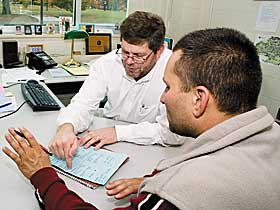  |
| HOME | THIS ISSUE | CALENDAR | GRANTS | BACK ISSUES | < BACK | NEXT > |
Award-winning advisor helps ACES students make decisionsby Karen Singer- October 23, 2006 |
||||
| One student is worried whether a course he took at another school will diminish his chances of getting into UConn's pre-pharmacy program. Another's coaches are concerned whether he can balance the courses he's taking with a rigorous training schedule. A third is perplexed as to which major to choose. During a 20-minute meeting with each student, James Hill, an advisor with the Academic Center for Exploratory Students (ACES), adroitly sheds light on their problems and offers suggestions to resolve them. His easy-going style fosters rapport, and his questions reflect concern about their well-being. UConn administrators recently recognized Hill's skills by selecting him for the 2006 Outstanding Professional Advisor Award. "You learn how to read body language and read facial expressions," says Hill. He has a caseload of nearly 400 students, mostly freshmen, and sees 16 to 18 a day this time of the year. He says his job is to teach students decision-making. ACES director Steven Jarvi says, "Jim makes each one feel like a person. He's especially good at remembering personal details." Jarvi notes that out of 3,200 freshmen, more than 600 are exploratory. Hill insists his method is not rocket science. One of his strategies is to insert personal facts about students he meets briefly during summer orientation into his electronic database. Hill came to advising via a circuitous route. A biology major at Hartwick College in Oneonta, N.Y., he earned a master's in botany at the University of New Hampshire and a Ph.D. in ecology at UConn in 1996. After doing research for a while, he says he discovered a "true passion" for teaching and interacting with students. In 1996, Hill began working with freshman and sophomore science and math students at the Academic Advisory Center in UConn's College of Liberal Arts and Sciences. Between 1997 and 1999, he was a director of undergraduate studies at Yale University, advising biology students. He has been a full-time academic advisor with ACES since 2001. "I like to tell my story to my students, and think it's important for them to understand that your major may not pertain to your career," he says. Hill's advising philosophy involves "connecting" with students, encouraging them to "think independently" and explore educational options, and supporting their academic and life decisions. His expertise resonates deeply with some of his students.
Hill kept in touch with Hazard after he returned home to Maine. "He's not just an adviser; he's a friend," says Sam Hazard, a senior who has known Hill since his freshman year, when he dropped out of the University for a while. "I was surprised someone from UConn still cared," Hazard says. "He talked about what I could do to get back in, what classes to take (at a local college) to make sure they were transferable, and didn't say it was impossible. That propelled me. "If it wasn't for him, and my family," Hazard adds, "I wouldn't be doing as well as I am today." Returning to UConn as a sophomore, Hazard entered the pre-pharmacy program, then switched to pathobiology. He plans to graduate this year, and hopes to start medical school in 2009. Hill also was instrumental in guiding Jenny Lipeika toward a major. "He's very good at pointing out the positives and negatives of each option and allowing you to choose for yourself," says Lipeika, a fifth-year pharmacy student who still keeps in touch with Hill. "Jim took the time to listen . and not push a career so he could move on to the next student," she adds. "He really took his time giving you the best advice he could and always answered all my questions. And when he didn't have the answers, he would point me to someone who had more knowledge." Another upper-class student, James Chen, recently stopped by to have lunch with Hill. "He's just a great friend," says Chen, a biology major who plans to graduate in May and then spend a year in China. As for this day's challenges, Hill informs the student worried about the course he took elsewhere that he will meet with his supervisor to discuss the student's special circumstances. He advises the athlete to see how he did on his first exams before deciding whether to drop any courses. He tells the new arrival on campus that she has time to explore her career options, and reassures her that changing her mind is okay. Moments after she leaves, another student arrives. Pulling up the student's record, he gives it a quick glance and prepares to do what he does best. |
| ADVANCE HOME UCONN HOME |

